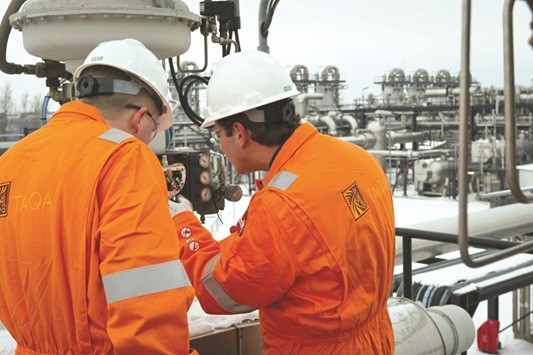Abu Dhabi National Energy Co had its credit rating cut one level to A- by Standard & Poor’s, which cited what it sees as increased risks to state support for the utility known as Taqa.
Standard & Poor’s Global Ratings downgraded Taqa’s rating from A and revised the outlook for the company’s debt to “negative” from “stable,” it said yesterday in a statement. “The downgrade reflects potential risks to our current assessment that Taqa has an extremely high likelihood of receiving support from the Abu Dhabi government,” S&P said.
Taqa has written off assets, sold businesses and cut jobs and spending after losing money due to acquisitions and lower crude prices over the past two years. The company reported a 2016 loss of 19bn dirhams ($5.17bn), after losing 1.8bn dirhams in 2015. Taqa plans to sell some of its North American oil and natural gas assets to help raise cash for investment, Acting Chief Operating Officer Saeed al-Dhaheri said last week.
The yield on Taqa’s 2021 bonds rose 5 basis points, the most this month, according to data compiled by Bloomberg. The yield on the 2026 bonds climbed 3.1 basis points, the biggest increase in a week.
The company, with power plants in Abu Dhabi, gas fields in Canada and a project to pump oil in Iraq, previously held a put option allowing it to sell some of its hydrocarbon assets at a fixed price to another government entity. That put option ended, Taqa said last month. Its owner Abu Dhabi Water & Electricity Authority gave Taqa rights to use land where the utility operates power plants, to help offset the 2016 loss. The change from a put arrangement is “a weaker mechanism for support to Taqa,” S&P said. “Recent related-party transactions at Taqa, including removal of a favourable put arrangement, raise potential risks to our view of the level of government support,” S&P said.
“The negative outlook reflects the risk of a multiple-notch downgrade if we revise down our assessment of the likelihood of government support.”
Taqa said there has been no change in the degree of government backing it receives. The transfer of land rights in December 2016 “demonstrated continued support from our majority shareholder, in line with a long track record of support in recent years,” al-Dhaheri said in a separate statement.

Taqa has written off assets, sold businesses and cut jobs and spending after losing money due to acquisitions and lower crude prices over the past two years.
